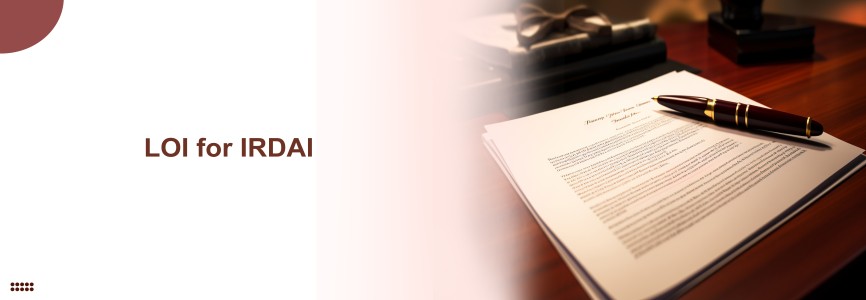A Letter of Intent (LOI) crops up in two different contexts in an IRDAI licensing journey. First, there are insurer-side LOIs/comfort letters that show commercial intent to work together. Second, there is the Authority’s own in-principle approval (often informally called an “IRDAI LOI”) that precedes the final certificate of registration.
Once Private Limited Company or LLP registered with MCA along with IRDAI NOC for Name, you may proceed for the ORDAI Application for getting a license but while applying to IRDAI for an Insurance Marketing Firm (IMF) or Insurance Broker licence, you should obtain Letters of Intent (LOIs) from the insurers you intend to work with, clearly stating the product lines/categories. These LOIs add credibility to your application and demonstrate that insurers are willing to commence business once the licence is granted.
What an insurer LOI and why it matters
An insurer LOI (or comfort letter) is a short, non-binding document issued by an insurer stating that, once you are registered, they intend to onboard you and execute definitive agreements subject to their due diligence and IRDAI norms. You do not transact any business on the basis of an LOI. Its value is commercial readiness: it tells the Authority you have a realistic pipeline.
-
For IMF applicants: Insurer engagements/agreements are core to the IMF model. Most applicants first collect LOIs from each proposed insurer and, after approval, convert them into executed agreements. Plan LOIs to align with the permitted tie-up caps across life, general, and health.
-
For Broker applicants (Direct / Composite / Reinsurance): The Brokers Regulations don’t list insurer LOIs as a formal mandatory annexure. However, in practice IRDAI scrutiny frequently expects at least 1–2 insurer support letters to evidence market access and business viability, especially for new entities without prior distribution history. Include them unless you have strong alternate evidence of pipeline (MOUs with large clients, historical books of business via team hires, etc.).
Learn more about What is an IRDAI IMF Company.
LOIs & IRDAI’s in-principle approval
IRDAI often issues an in-principle approval (the Authority’s “go-ahead subject to conditions”) before granting the final certificate and this Authority letter is regulatory and is not a substitute for insurer LOIs. Think of it as:
-
Insurer LOIs: Commercial intent from insurers to onboard you later.
-
IRDAI in-principle: Regulatory step from the Authority before final registration.
About LOI (strong model that works for IMF and, if used, for Broker)
A high-quality LOI should cover:
-
Parties & scope: Legal names, applicant category (IMF/Broker), proposed lines (life/general/health), and (for IMF) retail product categories.
-
Territory & channel: Intended area of operation and channel(s) consistent with your model (ISPs and in-person for IMF; open-architecture placement for Broker).
-
Conditions precedent: Effective only after IRDAI registration, subject to insurer’s due diligence, onboarding, and a signed definitive agreement.
-
Compliance hooks: Confirm adherence to IRDAI regulations, codes, outsourcing and remuneration norms, distance marketing rules (where relevant), and timely intimation of changes.
-
Validity: Reasonable validity (e.g., 6 months) to complete approvals.
-
Non-binding nature: Clarify that the LOI does not authorize solicitation or procurement until registration and execution of the final agreement.
Sample LOI text (Insurer → Applicant)
Subject: Letter of Intent to Onboard
Date: <dd/mm/yyyy>
To
The Principal Officer,
We, express our intent to onboard as an partner upon the grant of registration by the Insurance Regulatory and Development Authority of India (IRDAI).
-
Scope & Lines of Business: Subject to IRDAI permissions, we intend to work with you for distribution/placement of approved products in .
-
Territory & Channel: Business, if any, will be solicited and serviced in accordance with your authorised area of operation and channels permitted under applicable regulations.
-
Conditions Precedent: This intent is contingent upon (i) your obtaining IRDAI registration, (ii) successful completion of our due diligence and onboarding procedures, and (iii) execution of a definitive agreement.
-
Compliance: All activities shall adhere to applicable IRDAI regulations, circulars and codes, including norms on remuneration, outsourcing and distance marketing (as applicable). Any change in our engagement will follow regulatory requirements.
-
Validity: This Letter of Intent remains valid for months from the date above.
-
Non-Binding: This LOI is non-binding and does not authorise solicitation or procurement of insurance business until IRDAI registration is granted and the definitive agreement is executed.
For
Authorised Signatory
Name / Designation
(Use a separate LOI for each insurer. For IMF, ensure the total number of intended tie-ups stays within the line-wise caps you plan to operate under.)
FAQ's
Q1. Is an insurer LOI compulsory for IMF?
Ans. In practice, yes because IMF distribution is built on defined insurer engagements. Start with LOIs and convert to executed agreements after approval.
Q2. Is an insurer LOI compulsory for Insurance Brokers?
Ans. Not expressly listed as a mandatory annexure in the Brokers Regulations, but practically expected in most new applications. Include 1–2 support letters unless you have equivalent market-access evidence.
Q3. What does the “IRDAI LOI” mean?
Ans. That term informally refers to the Authority’s in-principle approval before the final certificate. It is a regulatory step and different from an insurer LOI.
Q4. How many insurer tie-ups can an IMF keep?
Ans. Plan your LOIs to match line-wise caps (life, general, health) and your territory; execute formal agreements post-registration.
Q5. Can I do business on the basis of an LOI?
Ans. No. You can only solicit or place business after IRDAI registration and execution of definitive agreements with insurers.











































































_crop10_thumb.jpg)


































































_crop10_thumb.jpg)
_crop10_thumb.jpg)



_crop10_thumb.jpg)


_crop10_thumb.jpg)





_crop10_thumb.jpg)

_crop10_thumb.jpg)














-suratgujarat-section-158_crop10_thumb.jpg)
-suratgujarat_crop10_thumb.jpg)
-(33)_crop10_thumb.jpg)



-ahmedabad_crop10_thumb.jpg)
-learn_crop10_thumb.jpg)

-learnn_crop10_thumb.jpg)



























































_crop10_thumb.jpg)























_Guidelines_learn_crop10_thumb.jpg)























_learn_crop10_thumb.jpg)
_crop10_thumb.jpeg)










_crop10_thumb.jpg)




_Second_Amendment_Rules,_2025_learn_crop10_thumb.jpg)







_learn_crop10_thumb.jpg)












































_learn_crop10_thumb.jpeg)























_learn_crop10_thumb.jpg)



_rd_roc_learn_crop10_thumb.jpg)















_learn_crop10_thumb.jpg)














_learn_crop10_thumb.jpg)
_Learn_crop10_thumb.jpg)











































_learn_crop10_thumb.jpg)




_learn_crop10_thumb.jpg)













_crop10_thumb.jpeg)















